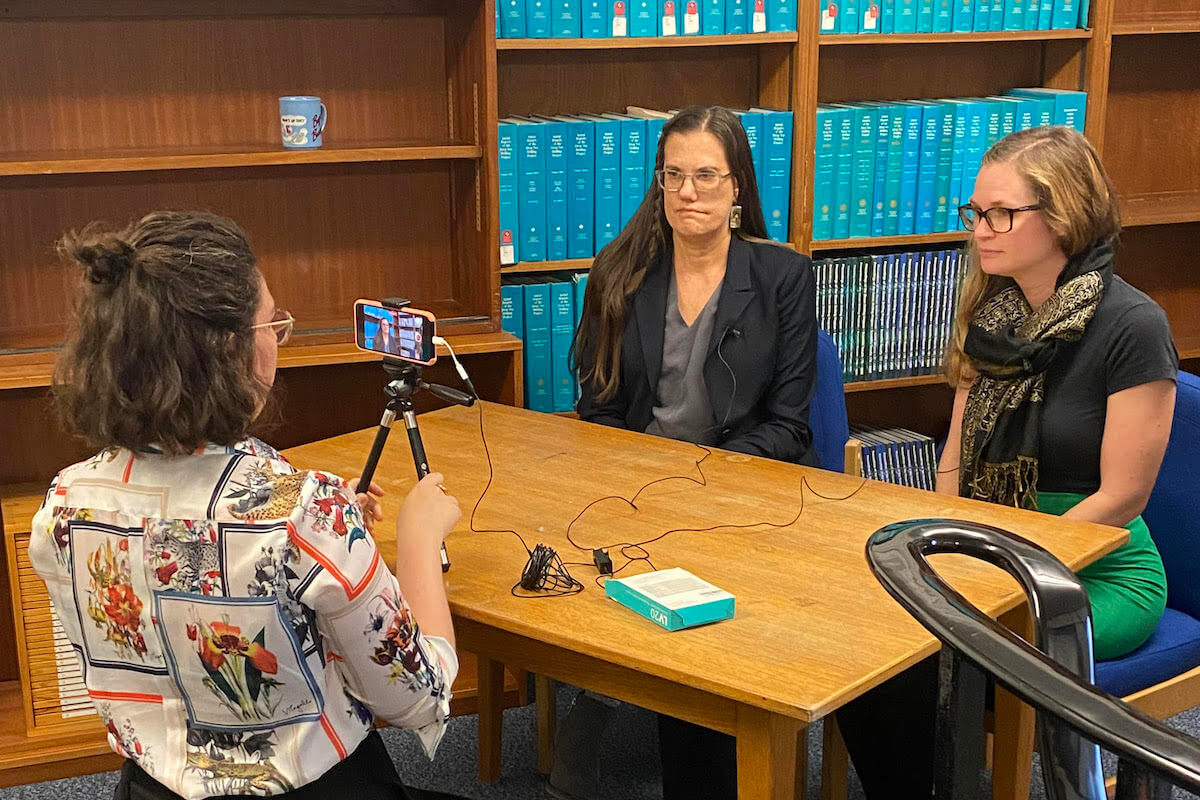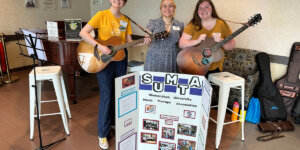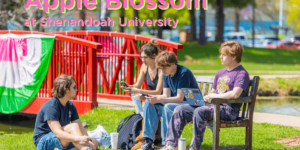Criminal justice students from Shenandoah University and geography students from Cardiff University in Wales teamed up for a special virtual learning opportunity during the Fall 2022 semester, during which they explored the topic of climate change and developed a series of podcasts that discuss various aspects of the global issue.
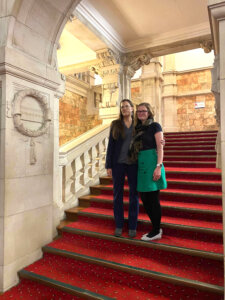 The collaboration was the product of the US-UK Fulbright Commission’s Global Challenges Teaching Award (GCTA), which paired faculty members from higher-education institutions in the U.S. and the United Kingdom to co-deliver a virtual exchange/collaborative online international learning (VE/COIL) course for their undergraduate students. Shenandoah’s Staci Strobl, Ph.D., professor of criminology and criminal justice, and Cardiff University’s Samantha Buzzard, Ph.D., a lecturer in climate science, were among the six total GCTA recipients in 2022-23 and partnered to implement a seven-week-long collaborative module into their respective classes that focused on climate change.
The collaboration was the product of the US-UK Fulbright Commission’s Global Challenges Teaching Award (GCTA), which paired faculty members from higher-education institutions in the U.S. and the United Kingdom to co-deliver a virtual exchange/collaborative online international learning (VE/COIL) course for their undergraduate students. Shenandoah’s Staci Strobl, Ph.D., professor of criminology and criminal justice, and Cardiff University’s Samantha Buzzard, Ph.D., a lecturer in climate science, were among the six total GCTA recipients in 2022-23 and partnered to implement a seven-week-long collaborative module into their respective classes that focused on climate change.
As part of the collaboration, Dr. Strobl and Dr. Buzzard visited each other’s respective institutions before beginning the project with their classrooms.
Students from both universities began meeting virtually in mid-October. The co-taught module culminated in a series of 12-minute podcasts that students developed and produced over the final weeks of the course within groups composed of learners from both universities. Each of the six groups selected a region of the world to focus the podcast on; within each region, students explored various impacts of climate change, including the physical processes, social effects and legal ramifications.
Students deliberately avoided regions located in the United Kingdom and the United States, so that all the locations were mutually foreign. Instead, they chose India, the Canadian arctic, Greenland, the south Pacific, the Arabian Gulf and western Australia. Structured around the insight from the students’ different disciplines, the podcasts explored topics such as the rising ferocity of heat waves, droughts, extreme rainfall, glacier melt, and sea level rise, and the subsequent impacts of each on the associated locations.
Dr. Strobl described the project as a “structured challenge” that helped the students become more well-rounded. She praised the students’ commitment to a project that, at times, felt daunting.
It’s a new kind of challenge when you’re trying to cooperate with somebody that’s from a different culture and a different institution. Yes, it can be really hard, but if you can navigate that, then you’re on the next level of your ability to work with other people in whatever your field is. It encourages connections and lateral thinking in ways that we really want to foster.”
Shenandoah Professor Staci Strobl, on the challenge and benefit of conducting a Collaborative Online International Learning virtual-exchange project in the classroom
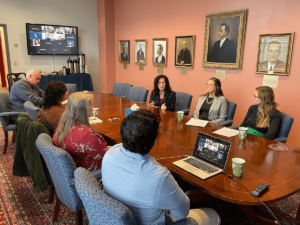 The podcasts students created were designed to be informative, evidence-driven and solutions-focused while being accessible to listeners of all kinds. Students from Cardiff University were able to provide details around the physical geography and environmental aspects of climate change, detailing past, current and predicted changes to the region of interest. Shenandoah University students provided a human focus, with investigations into legal and criminal justice aspects of climate change.
The podcasts students created were designed to be informative, evidence-driven and solutions-focused while being accessible to listeners of all kinds. Students from Cardiff University were able to provide details around the physical geography and environmental aspects of climate change, detailing past, current and predicted changes to the region of interest. Shenandoah University students provided a human focus, with investigations into legal and criminal justice aspects of climate change.
“Having Shenandoah students participate in an assessment with our Cardiff geographers was a wonderful experience for me to learn more about aspects of climate change outside of my own discipline,” Dr. Buzzard said. “I know that my students benefited hugely from this chance to think in a different, creative way, too.”
Shenandoah and Cardiff students worked within their groups to provide a coherent synthesis of the multidisciplinary topics and provide stories of the people living in their chosen location. The students were given creative freedom around their podcast format, and submissions included students playing the roles of locals impacted by climate change, climate scientists, and business professionals.
The podcasts really captured the piling on of physical and human effects that are happening and will happen in each location as a result of climate change. The podcasts drive home the point that this global challenge requires all societies to cooperate in adapting to the physical changes and to think through how to help people survive and even thrive in a time of great upheaval. Our students have creative solutions when creative solutions are exactly what is needed.”
Staci Strobl
Shenandoah University Dean of the College of Arts and Sciences Jeff Coker, Ph.D., praised the students’ work in developing and delivering the information in the podcasts. “As I was listening, I tried to count the number of disciplinary lenses that came into play here … and eventually stopped counting. The students are so poised and articulate,” Coker said.
The benefits of the Global Challenges Teaching Award extended beyond Strobl’s classroom at Shenandoah, as she enlisted the help of Associate Professor of Music Production and Recording Technology Graham Spice, M.S., to improve the sound quality of the podcasts and turn them into a more polished product.
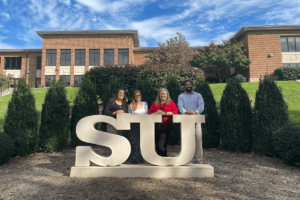 Throughout the process of training, preparing and implementing the COIL module in the classroom, Strobl worked alongside SU team members Younus Mirza, Ph.D., director of the Barzinji Institute for Global Virtual Learning, and Karrin Lukacs, Ph.D., director of Shenandoah University Transformative Teaching and Learning. Strobl said Shenandoah University, because it is “small and nimble,” lends itself well to the experimental aspects of COIL.
Throughout the process of training, preparing and implementing the COIL module in the classroom, Strobl worked alongside SU team members Younus Mirza, Ph.D., director of the Barzinji Institute for Global Virtual Learning, and Karrin Lukacs, Ph.D., director of Shenandoah University Transformative Teaching and Learning. Strobl said Shenandoah University, because it is “small and nimble,” lends itself well to the experimental aspects of COIL.
This idea of having these totally different programs of students with very different backgrounds – and cultures, in this case – it feels like it would be just too unruly and wouldn’t work, but actually those differences are both the strengths and the weaknesses of COIL. It’s like the challenge and the joy of this is making it work, because it’s very rewarding to stretch like this and have it work out. It’s very rewarding because you see a synergy that you don’t see in a normal classroom.”
Staci Strobl, Shenandoah University professor of criminology and criminal justice
